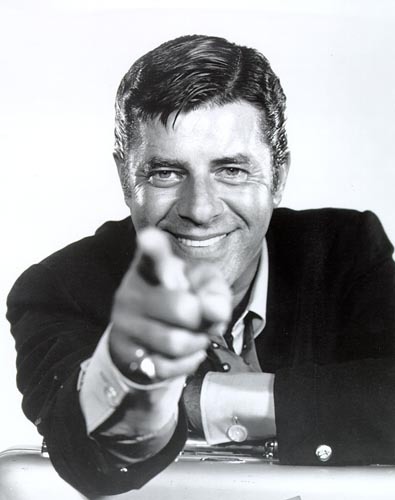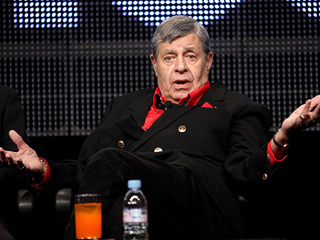 Dying Sunday at 91, two weeks before another Labor Day, Jerry Lewis was spared watching another Muscular Dystrophy Telethon without him.
Dying Sunday at 91, two weeks before another Labor Day, Jerry Lewis was spared watching another Muscular Dystrophy Telethon without him.
Lewis, who helped create the annual event, had been discarded around 2011 after raising $1.5 billion and creating a cultural event that tied old vaudeville to new style fundraising and schmaltz.
And while many may remember him largely for that role, since he did it for decades, older folks will recall his unhinged comedies, and the very oldest among us will remember his clowning opposite Dean Martin for what was the most successful comedy duo of its day.
When Martin met up with Lewis, the latter was doing a routine rather like latter day Andy Kaufman — pantomiming to records (he’d end up having a charting record aping his hero Al Jolson). But when Martin and Lewis were together, they’d cause riots in live appearances and break box office records with their movies, though they were derided as “the organ grinder and his monkey” by detractors.
On his own Lewis let loose with a number of comedy films in which he had total control. I got to study these as a kid, since they were presented weekly at the middle school for 25 cents admission. I was just a grade school kid, but my mom helped out at the refreshment counter, so I did the posters for things like “The Bellboy,” “Cinderella” and “The Nutty Professor.”
A quarter century later, I went out on an icy night to see a live stage performance he did in New London.
Wearing a tuxedo and backed by a 16-piece orchestra, he titled it “Jerry Lewis . . . Unlimited” and it was a throwback – not only to the comedian’s own career, but also to an almost bygone aspect of show business, the variety show.
He told old jokes with goofy, cross-eyed faces, a horsey grin, knocked-kneed stumbling across the floor.
He sang old Jolson tunes. He got sentimental as the sad clown portrait which preceded the show. He mimed to records again and did a soft shoe.
I was interested to see it all, even though my car spun out wildly on the ice during the ride home. As I did a 360, expecting to slam into a tree, I had time to think to myself: “The last thing I did in my life was a Jerry Lewis show?” (I did not die).
Lewis himself had complaints about his treatment in the news media during the show (“They say I’m sentimental! That I’m corny!”).
 But if he was miffed then, he was even more so the next, and last, time I saw him live, during a press conference at the TV Critics Association summer press tour six years ago. It was a little bit testy, in part because he couldn’t hear very well.
But if he was miffed then, he was even more so the next, and last, time I saw him live, during a press conference at the TV Critics Association summer press tour six years ago. It was a little bit testy, in part because he couldn’t hear very well.
“I’d like to remind you folks,” Jerry Lewis said, “I’m 85.”
It wasn’t an excuse. He was just saying, “just so you know. The legs aren’t doing what they used to. My heart begs them but it’s constantly denied. I can’t remember what I thought I wanted to recall a minute before I walked up here. But I’m the happiest old man you ever saw.”
Still, he did not sound like the happiest old man we ever saw.
He was explaining that the key to success in entertainment in 2011 was: “You just have to be bad.”
“The business is scrounging around for what to do. And the first thing a good comic must do is let them know he hasn’t changed. He can bring that same veracity, and that same performance to a medium that’s running around knocking their brains out trying to see how we beat the fat lady at 375 pounds, and in four months she’s going to be 240. Who gives a shit?”
He seemed to be railing against reality TV (and particularly shows such as “The Biggest Loser” taking the slot of comedies and dramas on TV).
“It’s ridiculous. It’s ridiculous. And kids, they get on ‘American Idol.’ They’re all McDonald’s wipe-outs. They’ve all been dumped. They’ve worked there and now they’re doing that. And of course they all play a guitar, which takes the place of music. Ha!” He gave one of those big exaggerated “Hey Lady!” laughs. “Ha! Ha!” stopping as quickly as he had started and getting more serious:
“We don’t have the soul in our industry that we had when I was working. And the soul has been desperately deteriorated, only because you got a guy that’s running a network whose aunt died and left him some stock. So someone says, ‘Make me a malted,’ and he said, ‘Poof, you’re a malted.’
A vaudeville joke had somehow snuck in there. But he quickly gets back on track on this unnamed executive: “He’s now an executive in charge of entertainment.”
“Do I sound pessimistic?” he asked. “I love my industry. I love what it does. I don’t allow people in my family to use the term ‘TV.’ That’s stupid. It’s ‘television.’ It’s a miracle. It’s entitled to that respect. And that’s the way I am about it. And when I watch it, I want it to grab me. I want it to be like I ran home and I made sure to be there before goddamn ‘Law & Order’ went on, and long before Jack Webb [and] the cop shows. Where we ran home to see [Milton] Berle on a Tuesday night. Nobody wants to run home now and see anything. They run home and hope there’s something. And we got to fix that.
“The industry has destroyed themselves. The motion picture industry now is no longer, as far as I’m concerned. And we can fix it.”
But it won’t be fixed by making movies available online or on phones. “They put all of their product on the goddamn stupid phone. You’re going to put ‘Lawrence of Arabia’ on that stupid son of a bitch? That gets me crazy, Pal. That gets me crazy.
“But you’ll see ‘Lawrence of Arabia’ on your television set because there won’t be television in three years. Why? Because Proctor & Gamble says, ‘Are you nuts? You want me to spend a $1,600,000 for that variety show when I can get the fat lady to lose weight for 62,000 bucks. Let’s go with that one. We’ll call it reality.’ And that’s what they’ve done.”
He went on.
“Do you notice that in a dramatic part in a film you don’t hear music, you hear a vocal. You hear someone singing a vocal that relates to the scene. Well, the first thing you don’t do if you’re a filmmaker is distract. The biggest danger in your work is distraction. And you’re putting this vocal at the top of the film’s big moment because they don’t want to spend what I spent on an 80-piece orchestra to score it. ‘Let’s do what they’re doing with the guitar, and that will be fine.’ Oh, OK.”
Perhaps realizing he was ranting a bit, Lewis said “I think it’s important in a public sense to appear to be positive and not negative. But if we don’t allow negative in, we won’t fix it. And I believe that we come from a community in this town that has great, great product in their brains, and they’ve got to be let out and let them work. And I think — not to be redundant, but I love using that word, so I do it on purpose – Not to be redundant, you have to be a good man to do good work. Now, I don’t mean to sound like Bishop Sheen and Jimmy Swaggart, but you do have to be a good man to do good work. And I believe if that’s the ground rules, then I got to do everything I can to help fix it.”
So, he said, he hoped he would be invited to industry events to expound like this.
Because content will be more important than all the gizmos that are now playing entertainment.
“We’re not going to have human beings in 20 years. That’s all!” he declared. “People are not conversing with people. People are not talking to human beings and getting a sense of what maybe they missed, and then they come back to us with something meaningful.
“I am an odd duck in that I am old-fashioned, mid-Victorian, and terribly, terribly caste conscious. Of course that’s the way I am. I believe that’s okay. It doesn’t hurt anyone.
“But when you see the things that are despairing in their attempt to do something, I sit back and I suffer for them. I’m not glad they’re not doing well. I suffer that they’re not. Because it’s not good for the industry. It’s not good for my children. It’s not good for my grandchildren. And it’s not good for my great grandchildren.
“The spirit of child has been sucked out of the industry. And unless people remember everyone here has a child within them –
That child never goes away when you are seven, eight, and nine. It stays with you. And you know damn well who I’m talking to. Because you will do things that are childlike because they’re so wonderfully refreshing and innocent and safe. And if you don’t have some of that, an industry will just go by like a strong wind. And that hurts my heart. Am I depressing you folks? That wasn’t my purpose, I swear.”
And so he ended his press conference with a joke:
“I hadn’t been on the subway train in 35, 40 years. And I took my daughter to New York for her 19th birthday, and we had a wonderful time. And I said, ‘Danielle, wouldn’t you like to see what the subway is like? Because you’ve never been there. I wasn’t there since 50, 60 years ago.’ ‘Yeah, Daddy, I’d like that.’ So we get on subway train. And my daughter and I are sitting somewhat like this, and it stops at a stop, and a guy comes on with leather pants, rings from his nose, rings from the ears, tattoos this large over his neck and collar, with leather pants and a leather jacket, and he had chain coming from every orifice. Now, his hair was spiked. It was yellow, green, red, purple, and I’m staring at him. So the young guy says to me “What’s the matter, old man, didn’t you ever do something extraordinary in your life?” I said, “Yes, as a matter of fact. 25 years ago I had sex with a parrot. I thought you were my son.”